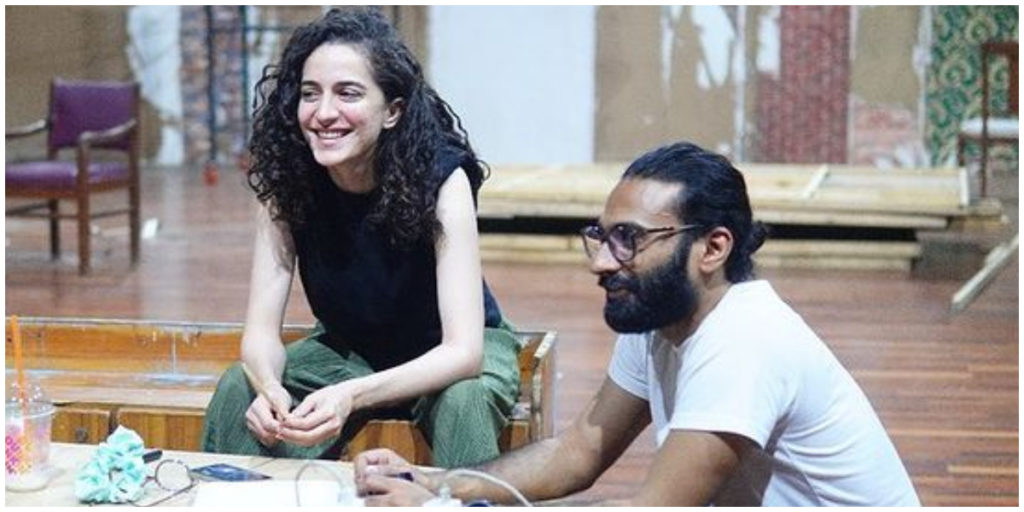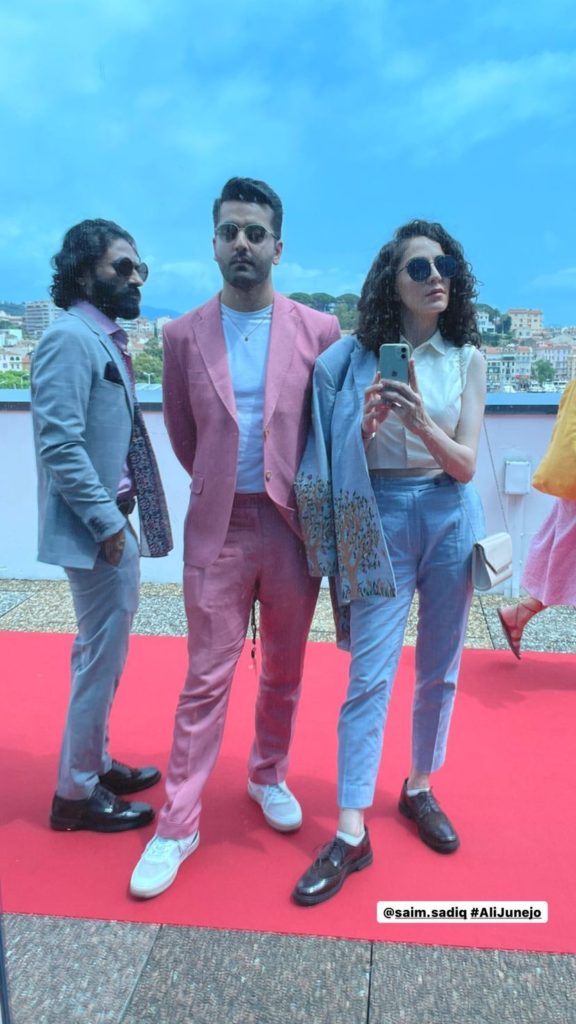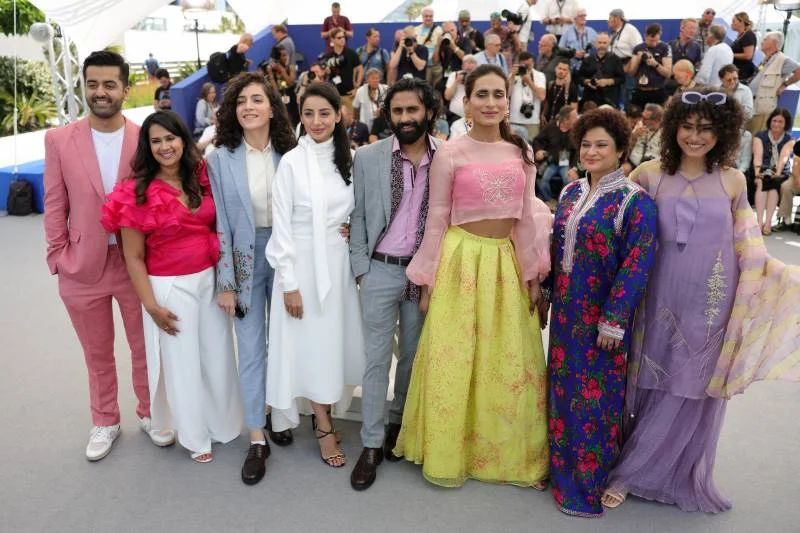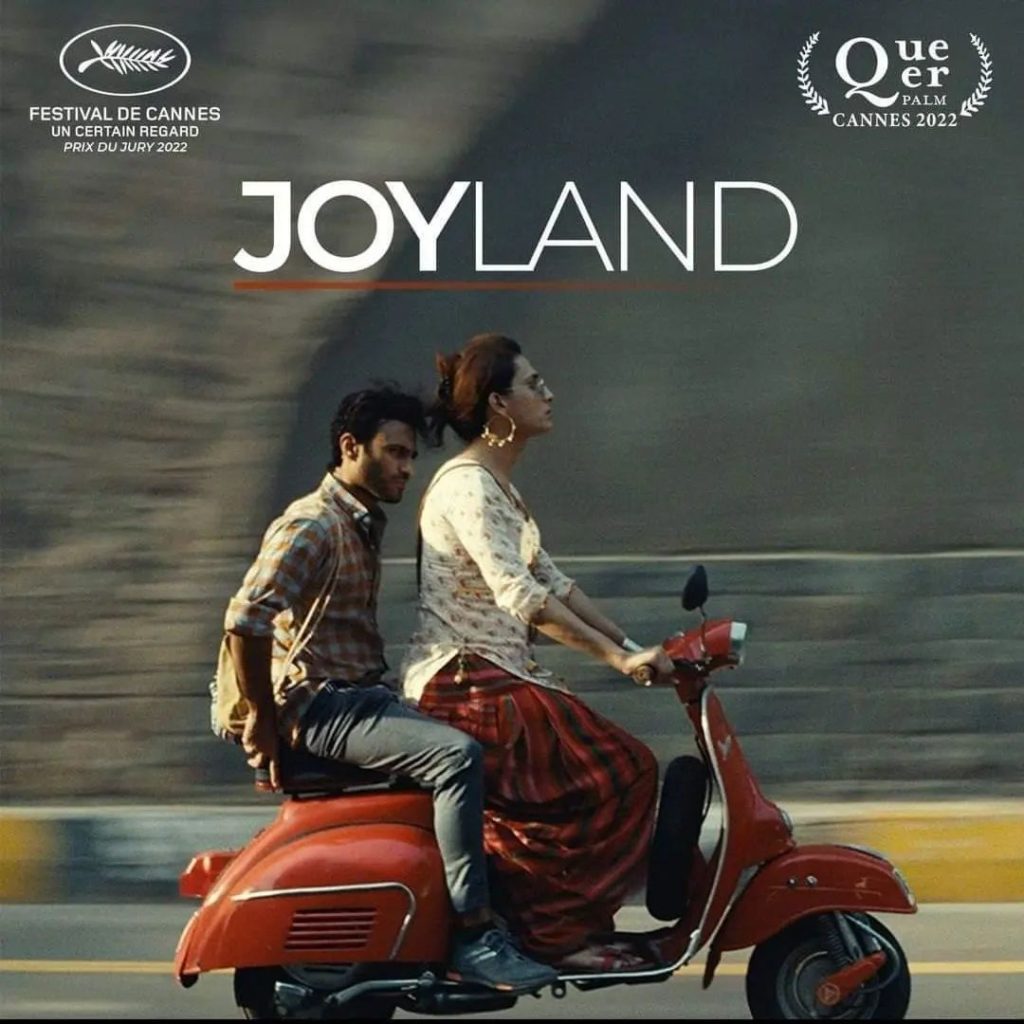
Rasti Farooq and Ali Junejo are two actors from Saim Sadiq’s Joyland, a film that has brought much recognition and honour to the country in 2022 following its historic double win at the Cannes Film Festival. The film received a lengthy standing ovation at its premiere at the fest. It also bagged Un Certain Regard Jury Prize as well as Cannes Queer Palm prize for best LGBT, “queer” or feminist-themed movie.
Ali Junejo is a theater actor who has been working for over two decades and has written and directed plays. Rasti Farooq is a writer, actor and producer at Puffball, a Lahore based animation studio with award winning films like Shehr-e-Tabassum and Swipe. As actors who have walked the Cannes red carpet representing the country, they are overwhelmed with joy but until the film makes it to local theaters, the two paired up for another honest story.

(L-R): Ali Junejo, Saim Sadiq & Rasti Farooq
In collaboration with OLOMOPOLO Media, Rasti and Ali have performed Both Sit In Silence For A While successfully in Lahore and Karachi so far and have garnered rave reviews. It is an original dark comedy play that’s inspired by absurdist writings. Written and directed by Ali Junejo and performed by Ali and Rasti together.
In a recent tête à tête with Something Haute, Ali and Rasti spoke at length about their experiences as theater actors and storytellers, their new play and a lot more.
Tell us about your journeys as an actor?
AJ: I’ve been doing theater for a very long time. I auditioned for a play; it was like a murder mystery thing and then I got hooked to it. I spent some time out of the country and then came back in 2012, and then I just continued doing theater. I was writing, directing and performing and I’ve worked with NAPA a lot.
RF: I remember being very young, I always wanted to be on stage. I used to participate into debates and skits at school. Most people would get very nervous on stage but I loved it. Then I focused on my studies because I thought acting is a career (laughs). But I loved stage so I did theater in Lahore as well and I met Saim Sadiq. He was making a short film when we were in college and I did that. I got to know more directors and filmmakers like Tabish Habib and Kanwal Khoosat, and I was doing more short films and cine-plays until Joyland came along.

Team Joyland
How important is validation for actors? And is it possible for a theater actor to be recognized, considering it is not a widely popular medium like TV and films in Pakistan?
AJ: There is a type of actor that has a lot of fun is rehearsals when nobody is watching and there is some magic happening when you’re trying to unpack a scene or fighting with your director to get the motivation of your character. I am addicted to that place and I am quite certain that Rasti is also like that. The sense of validation that actors get from their peers is what most actors live for. It’s when the scene begins to develop into something and on stage if it goes somewhere beyond.
No matter how many applauses you get, the audience have seen that one-hour performance and they have no idea about the 3-month long rehearsal that went into that. There is an element of audience’s love but that balance of validation from the audience as well as rehearsal time meet at a time which I call storytelling.
RF: Validation changes with the kind of medium you’re into. The awareness of something organic and real is happening between actors and in that moment, you do seek validation from your director. I also always fall on those private moments during rehearsals when I look at my director to see if I’ve done it right.
As creative people who have worked as a writer, director or a producer in this field, are you satisfied with the kind of stories we’re telling today?
RF: I think it’s a kind of ‘Yes’ and ‘No’ answer for me. I’ve been very lucky and fortunate that I was picky from the beginning and chose to do work that I would add value. So, I ended up not doing a lot of work. But I worked with some amazing people who are curious to talk about uncomfortable situations and unpleasant people. They think about storytelling in a unique way. Pockets of these storytellers exist in Pakistan but they are few and I wish there were more so I could just be spoilt for choice. A feature film like Joyland will only come once in a decade. The medium of web series has really taken off but if I look at the kind of stories being told through web series, I am not sure I’m that excited by it. We’re not thinking hard enough with the kind of characters we are writing. Like I am all for female forward stories but very quickly it loses its charm because what is the value in repetitively showing deviant, rebellious women who murder their ex-partners. Sure, it’s fun and exciting once but two shows about it. I think there is so much more to explore about human kind.
Read: In conversation with Saim Sadiq: The making of Joyland
AJ: We have a tendency to put characters into a position of a victim of something. That’s how we justify their actions. It is okay but I think the questions can be deeper than that, the characters can be well thought-out than that, their arcs can be may be even more self-reflective. There is so much more about us, from this part of the world, that makes us far more complicated/ important than just victims.
View this post on Instagram
A word about their new play ‘Both Sit In Silence For A While’ which is a dark humour.
RF: That’s why I love Both Sit In Silence For A While because here we have two people in a relationship for some time and now they are kind of colliding. You’ll realize that both of them are being very unpleasant to each other, extremely indifferent to the other’s pain, they are being short and sharp with each other. At no time the play shows that this person is being like that because he/she has been through this horrible thing. You can sympathize with them and you can also dislike either of the character which is just the human experience. I don’t think storytellers have a lot of responsibility towards their audiences but the work shouldn’t just be a cynical examination of something.
AJ: After compromising for years in years in relationships, people get resentful. So, you’d be arguing right now about something, but you have the last 20 years of your life in mind. I find that really interesting. If you can’t laugh at your most horrible experiences then you are never going to heal.

A poster showing Biba (Alina Khan) and Haider (Ali Junejo)
In a country where a segment of the society doesn’t let a transgender (i.e. Mehrub Moiz Awaz) speak at a forum, do they think there will be acceptance for a film like Joyland that has a trans woman in it?
AJ: Joyland is a film that features an ensemble of characters and there happens to be a trans woman in the film. The film starts as a love story and ends as a love story. It has men, women, married couple, dancers, even a goat in it; it has so many things in it. So, when I am confronted with this image that Joyland is a trans-film. Well… yes and no. Saim writes so beautifully that he gives you everybody’s stories and a transgender person’s journey is also a part of that story. It is being shown as just that but it is a collection of all kinds of stories.
At a time like today, what is required is honest storytelling by women, men, trans people and anyone else under the spectrum of humanity. It is unfortunate that what happened should not have happened.
RF: We get asked this question a lot at film fests that ‘do you think Joyland will change things for Pakistan?’ It’s silly to assume that one film is going to change decades and decades of history. But I think this can and will change is when audience will watch it in cinemas, they will realize that trans-people have existed in the world since the beginning of time. You (within your limited social circle) might not interact with people from the trans community but that doesn’t mean that they don’t exist, work or thrive. I think what this film tells is that trans people around us have the same human struggles likes everybody else. Visibility is the important step towards acceptance and what better way than to just show people as they are in their regular daily lives.





